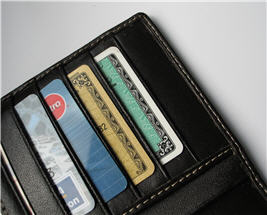Imagine There Are No Credit Cards, It’s Not Easy Even if You Try …
by Chris Buzzard What would happen to the U.S. economy if everyone paid off their credit card debt? That's the question a reader sent in to MSNBC.com’s John Schoen. It's an important topic: according to the Federal Reserve’s 2004 Survey of Consumer Finances, the percent of families carrying a credit card balance increased from 44.4% to 46.2% from 2001 to 2004, a higher increase than the previous 3-year period. For households carrying balances, the median balance rose 10% to $2,200 and the mean rose nearly 16% to $5,100. The problem is particularly severe for young people just graduating from college--a group some call "Generation Debt."
What would happen to the U.S. economy if everyone paid off their credit card debt? That's the question a reader sent in to MSNBC.com’s John Schoen. It's an important topic: according to the Federal Reserve’s 2004 Survey of Consumer Finances, the percent of families carrying a credit card balance increased from 44.4% to 46.2% from 2001 to 2004, a higher increase than the previous 3-year period. For households carrying balances, the median balance rose 10% to $2,200 and the mean rose nearly 16% to $5,100. The problem is particularly severe for young people just graduating from college--a group some call "Generation Debt."But even if paying off your own credit card would be good for you, would it be good for the economy as a whole if everyone did? Not necessarily. First, where would the money to pay off this debt come from? Creditors will not simply forgive debts. If consumers stopped all discretionary spending and diverted money to pay down debts, the results would be catastrophic to the economy. Nearly 2/3 of the U.S. economy is based on consumer spending, so GDP would dwindle and unemployment would skyrocket. If consumers tapped their stock and/or house equity to pay down debt, stock and real estate markets would be flooded with sellers and prices would plummet.
Even if it were frictionless, a credit card free world would have less spending power and would rock the financial services industry. Lenders make money by lending, and without consumer debt, banks would have a hard time surviving.
So, the moral of the story is that consumer debt plays a vital role in keeping the economy rolling and stimulating GDP, but it is up to individuals to manage their own finances responsibly.
1. What is the difference between good debt and bad debt? Cite some examples.
2. Do you think people carrying credit card balances is more a function of income or behavior? In other words, if someone carrying a high credit card balance receives a large raise, is he/she more likely to use the extra funds to eliminate the balance or will the balance remain despite the extra income?
Topics: Credit cards, Consumer debt, Personal finance



0 Comments:
Post a Comment
<< Home